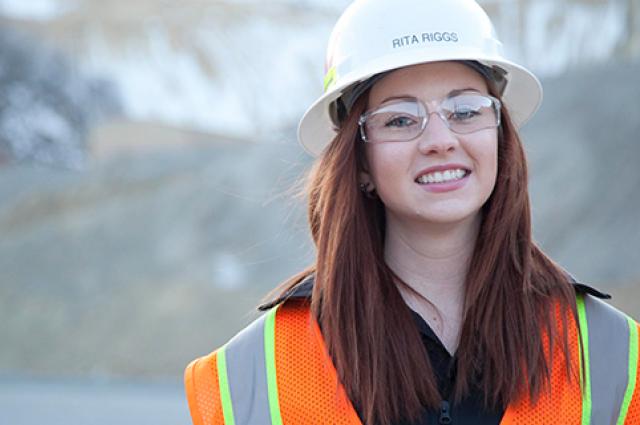The New Face of Mining: Rita Riggs
Rita Riggs dreams of one day working in a copper and gold mine in Mongolia, the central Asian country almost as vast as western Europe and known for its pastoral nomadic culture, harsh geography and even harsher climate. The only problem: Mongolia, which sits atop one of the world’s largest mineral reserves, bans women from working in underground mines.
| Women are persevering; change is happening. Mining is still seen as a quintessential male domain in many respects. But women the world over toil as miners, and more and more female mining and geological engineers are entering the industry, putting their mark on technological, environmental, corporate and social advancements. The University of Arizona is dedicated to helping fill the much-needed pipeline of mining and geological engineers. In part, that means making sure women continue to take their place in an industry expected to need 128,000 skilled workers by the end of the decade. "When I was growing up, I heard more about what careers women couldn’t have than what careers they could have," said UA Distinguished Professor Mary Poulton, director of the Lowell Institute for Mineral Resources and head of the mining and geological engineering department. "Today it is a different world. Women can access any career they want. Now the challenge is what you can do, not who you are." Young women just entering the profession feel they have a world of opportunity awaiting them, and those well into their careers and nearing retirement say they have had the ride of a lifetime. They are the new face of mining. And these are their stories. |
Still, Riggs has her "boy" name picked out -- Baxter. She is ready to cut her hair, dress up like a boy, and board a plane to one of the most sparsely populated countries on earth.
"I would do it in a heartbeat," she said.
In actuality, Riggs knows that she’ll just have to wait for the laws to change, a change for which her company is lobbying.
Riggs, a College of Engineering Ambassador who graduated in 2010, was the first woman to serve as mine manager at the University of Arizona San Xavier Underground Mining Laboratory, a student-run mine 23 miles south of Tucson, Ariz. She now is an operations supervisor at a Rio Tinto mine near Salt Lake City, Utah.
Riggs is grateful to be living in an era in which she can live her dreams, even if plans at the moment do not include Mongolia.
"Fifty years ago, I would not have been allowed here," said Riggs, who herself has a female manager. "People have made sacrifices that allowed me to get to where I am today."
"I decided right then and there, this is what I wanted to do, and I have never looked back," said the self-proclaimed rock nerd, who felt mining engineering neatly combined her loves of geology and math.
Besides, she added with a chuckle, "Most geologists don’t get to work with explosives."
Riggs credits her UA education with preparing her for the mining world in ways few other college mining programs could have, primarily by providing real-life experience at San Xavier, one of only a handful of student-run mines in the United States.
"At San Xavier, you get the reality factor, and you get it quickly; you don’t have to worry about it affecting your career," she said. "Many students graduate from college with no real mining experience and do not have the credibility to manage mine operations, but UA graduates are already ahead of the curve. We know that what looks good on paper does not always pan out; we learned how to have reasonable expectations for both manpower and equipment. And we have an ingrained appreciation for the value of safety."
Riggs also gained a strong understanding of the importance of sustainability, environmental stewardship, and corporate responsibility in the mining industry. And her feet are planted firmly in her convictions.
"Doing things correctly is one thing I am pretty passionate about, and environmental stewardship is a part of that," she said, adding that corporate responsibility is the other part.
"We have a chance to actually make a difference in a positive way," she said. "The way you treat your neighbors is huge, your attitude and your actions as a corporate citizen."


